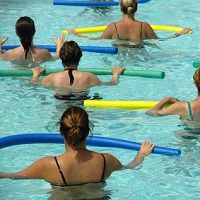Article
Aquatic Exercise Beneficial to MS Patients
Author(s):
Aquatic exercise appears to improve balance for people with multiple sclerosis (MS) and hemiplegia according to a recent review of 8 published studies. “It was concluded that exercises in water improved postural control in patients with multiple sclerosis.â€

Aquatic exercise appears to improve balance for people with multiple sclerosis (MS) and hemiplegia according to a recent review of 8 published studies. The review, conducted by Pichanan Methajarunon, MSc, PT, of Huachiew Chalermprakiet University in Thailand, and colleagues, was published in the Hong Kong Physiotherapy Journal recently.
The reviewers examined studies that assessed whether or not aquatic exercise improved balance for patients with three neurological conditions: MS, hemiplegia, and Parkinson’s disease (PD). They identified 8 studies which they described as having a methodological quality which “ranged from fair to good.”
The primary outcome the reviewers examined was balance control, and they looked at each condition separately. For MS, the studies differed in design and the ways that exercise was measured, but the reviewers say, “it was concluded that exercises in water improved postural control in patients with multiple sclerosis.”
Patients with PD in the studies appeared to also benefit from aquatic exercise, though the results were less-clear-cut. Two of the studies examined involved PD patients; both compared improvements between patients who completed land-based and water-based exercise. Upon initial assessment, the two groups showed similar improvement, however in one of the studies, a reassessment 17 days later showed the aquatic exercise group retained improvement, but the land-based exercise group did not.
Three studies in the review compared land-based and aquatic-based exercise among patients who had hemiplegia as a result of stroke. The researchers report “All studies demonstrated that aquatic exercise resulted in an improvement in static and dynamic balance compared with land-based exercise.”
The secondary outcome the reviewers considered was gait ability. Among MS patients, the researchers say, “aquatic exercises also provided significant increase in gait speed.” Only one study of PD patients investigated the impact of aquatic exercise on gait, and it did not show statistically significant improvements. None of the studies investigating gait included hemiplegia patients.
The researchers conclude that “the employment of aquatic exercise programs potentially offers short-term benefits on balance in individuals with multiple sclerosis and hemiplegia,” but add that there were not enough participants with PD in the studies reviewed for them to draw conclusions, and add “It is possible that the effectiveness of aquatic exercise is dependent on the nature of the underlying disease or impairment.”



